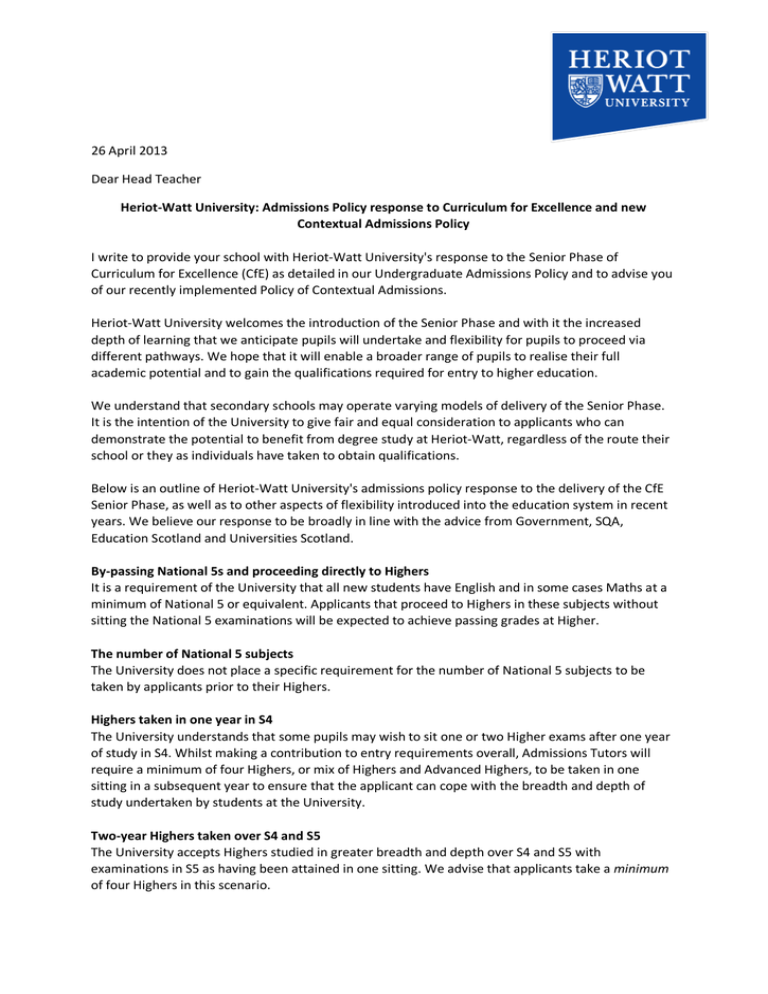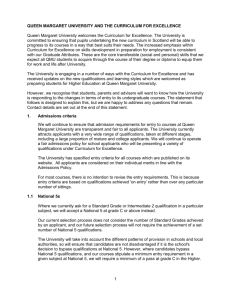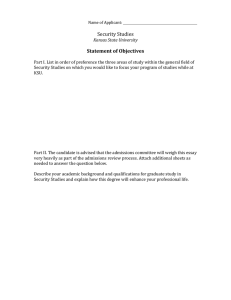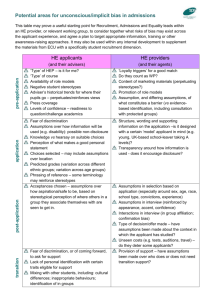26 April 2013 Dear Head Teacher
advertisement

26 April 2013 Dear Head Teacher Heriot-Watt University: Admissions Policy response to Curriculum for Excellence and new Contextual Admissions Policy I write to provide your school with Heriot-Watt University's response to the Senior Phase of Curriculum for Excellence (CfE) as detailed in our Undergraduate Admissions Policy and to advise you of our recently implemented Policy of Contextual Admissions. Heriot-Watt University welcomes the introduction of the Senior Phase and with it the increased depth of learning that we anticipate pupils will undertake and flexibility for pupils to proceed via different pathways. We hope that it will enable a broader range of pupils to realise their full academic potential and to gain the qualifications required for entry to higher education. We understand that secondary schools may operate varying models of delivery of the Senior Phase. It is the intention of the University to give fair and equal consideration to applicants who can demonstrate the potential to benefit from degree study at Heriot-Watt, regardless of the route their school or they as individuals have taken to obtain qualifications. Below is an outline of Heriot-Watt University's admissions policy response to the delivery of the CfE Senior Phase, as well as to other aspects of flexibility introduced into the education system in recent years. We believe our response to be broadly in line with the advice from Government, SQA, Education Scotland and Universities Scotland. By-passing National 5s and proceeding directly to Highers It is a requirement of the University that all new students have English and in some cases Maths at a minimum of National 5 or equivalent. Applicants that proceed to Highers in these subjects without sitting the National 5 examinations will be expected to achieve passing grades at Higher. The number of National 5 subjects The University does not place a specific requirement for the number of National 5 subjects to be taken by applicants prior to their Highers. Highers taken in one year in S4 The University understands that some pupils may wish to sit one or two Higher exams after one year of study in S4. Whilst making a contribution to entry requirements overall, Admissions Tutors will require a minimum of four Highers, or mix of Highers and Advanced Highers, to be taken in one sitting in a subsequent year to ensure that the applicant can cope with the breadth and depth of study undertaken by students at the University. Two-year Highers taken over S4 and S5 The University accepts Highers studied in greater breadth and depth over S4 and S5 with examinations in S5 as having been attained in one sitting. We advise that applicants take a minimum of four Highers in this scenario. Highers taken over more than one sitting We accept that some learners may not obtain all the qualifications required for entry in one sitting and welcome applications from pupils in S6 who are undertaking further Highers and/or Advanced Highers to add to Highers they have already taken. Again, we will require a minimum of four Highers, or mix of Highers and Advanced Highers, to be taken in a single sitting to ensure that the applicant can cope with the breadth and depth of study at the University. Advanced Highers/ Scottish Baccalaureate Applicants who are seeking to enter SCQF Level 7 and who do not hold the requisite Highers from their studies in S4/S5 are advised to take further Highers or Advanced Highers or the Scottish Baccalaureate in S6. Whilst we recognise the progression in knowledge and skills that undertaking Advanced Highers and the Scottish Baccalaureate provides learners, applicants must still be able to present with the required number of different subjects at specific grades; bearing in mind that we do not count the Higher and Advanced Higher results for the same subject twice, (with the exception of some contextual offers). The majority of our programmes can be entered directly in SCQF Level 8 by applicants with the required Advanced Highers or Scottish Baccalaureate, (Science for most of our programmes), and we encourage learners to consider this as an option. Wider Achievements We welcome a structured approach to facilitating the engagement of young people with their communities and for experiential work-placed learning. Whilst academic attainment will remain as evidence of suitability for an offer of a place at Heriot-Watt, Wider Achievements will be one of a number of additional factors considered. Crucially, applicants should be able to demonstrate ways in which the skills they have developed via Wider Achievements have the potential to benefit them on their chosen course of study via their personal statement, thus enabling admissions selectors to give them the appropriate recognition. In addition to the above CfE policy response items, there will continue to be a number of underlying principles for entry to Heriot-Watt: • • • • Regardless of the qualifications and grades required for entry to some programmes, specific subjects will continue to be required to meet the demands of the degree programme and in some cases, the professional bodies accrediting some of the University's degrees. Entry requirements are indicative and in the majority of cases represent the minimum requirement for entry, unless the applicant is eligible for a differential offer under the University's Contextual Admissions Policy, outlined below. The number of places at the University is limited and it is not always possible to offer a place to every qualified applicant. When demand exceeds the number of places available, in addition to the attainment of grades in qualifications accepted for entry, the University will take a number of factors into account, such as: relevance, breadth and depth of previous studies, rigour and challenge of studies, and evidence of progression in studies, as well as certain contextual factors. We welcome any comments you have in response to the above. The information provided is based on our assumptions of the CfE Senior Phase given the information we have at this time. Our Admissions Policy will be reviewed annually to ensure that it is supportive of applicants in ways which are relevant and meaningful and we will communicate any significant changes to you. Policy of Contextual Admissions Heriot-Watt University has adopted a contextual approach to considering UCAS applications in our admissions process for 2013 entry to enable us to identify applicants with the greatest potential to succeed. The criteria we use to assess which applicants will be made a contextual offer focus mainly on socio-economic disadvantage although there are other factors that could impact negatively on an applicant's subject choices and level of attainment that we consider as detailed below. The University's Outcome Agreement with the Scottish Funding Council (SFC), requires us to increase the percentage of undergraduate entrants from the 'SIMD 20 and 40' (Scottish Index of Multiple Deprivation 20% and 40% most deprived neighbourhoods) in 2013 and beyond . Those in the SIMD 20 and 40 groupings are statistically underrepresented in higher education in Scotland and the SFC is seeking greater alignment between outreach programmes aimed at raising aspirations and attainment in targeted secondary schools and universities admissions policies. The University wholeheartedly supports the drive to increase the number of applicants from the most disadvantaged backgrounds to enter and successfully complete a degree programme. We consider there to be other measures that could also be used in addition to SIMD20/40 to capture the inequalities and disadvantage experienced by some learners who do not live within the defined postcode areas. We also recognise that the SIMD 20/40 measure may not be transparent to your pupils and thus does not lend itself to enabling applicants to self-assess whether they could benefit from a contextual offer. For these reasons we will continue to lobby, alongside other institutions from the University Sector in Scotland, for the adoption of a broader suite of measures that can be used to identify all applicants whose education experience has been adversely affected socioeconomically. In the meantime, the criteria the University has adopted to assess whether an applicant can be considered for a contextual offer are: • • • • • The applicants' home postcode is within the SIMD 20/40. The applicant is at a low progression school that is part of the SFC's 'Schools for Higher Education Programme (SHEP). The applicant has spent time in care/being 'looked after'. The applicant has been a carer for a long-term ill or disabled parent which has had a demonstrable impact on their studies. The applicant has suffered from an illness or disability which has had a demonstrable impact on their studies. Applicants studying Highers/ Advanced Highers may then be given a measure of flexibility in the offer-making stage and/or at confirmation. Flexibility may take one or more of the following forms: • • • Making an offer of, or accepting a student at confirmation with, up to two grades lower than the standard entry requirements. For example, AABB would become BBBB, AACC or ABBC. Making an offer of, or accepting a student at confirmation with, one less Higher than the standard entry requirements. For example AABB would be AAB or ABB. BBBBC would be BBBB or BBBC. At the offer or confirmation stage, counting one Advanced Higher taken in S6 as additional to the Higher taken in the same subject in S5, (as opposed to current practice where an Advanced Higher cancels out the same Higher). We hope that the above differentiation in entry requirements will enable a broader range of applicants to obtain a place at Heriot-Watt University. We welcome any comments in relation to the above information. We will of course advise you of future revisions to the policy, ideally prior to the start of the admissions cycle. Yours faithfully Ian Sutherland Admissions and Wider Access Manager T: 0131 451 8144 E: i.sutherland@hw.ac.uk




